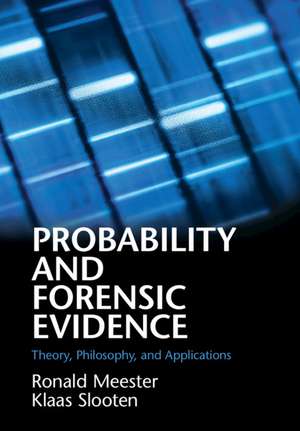Probability and Forensic Evidence: Theory, Philosophy, and Applications
Autor Ronald Meester, Klaas Slootenen Limba Engleză Paperback – 7 apr 2021
| Toate formatele și edițiile | Preț | Express |
|---|---|---|
| Paperback (1) | 361.92 lei 43-57 zile | |
| Cambridge University Press – 7 apr 2021 | 361.92 lei 43-57 zile | |
| Hardback (1) | 631.16 lei 43-57 zile | |
| Cambridge University Press – 7 apr 2021 | 631.16 lei 43-57 zile |
Preț: 361.92 lei
Nou
Puncte Express: 543
Preț estimativ în valută:
69.28€ • 75.27$ • 58.23£
69.28€ • 75.27$ • 58.23£
Carte tipărită la comandă
Livrare economică 21 aprilie-05 mai
Preluare comenzi: 021 569.72.76
Specificații
ISBN-13: 9781108449144
ISBN-10: 110844914X
Pagini: 424
Dimensiuni: 170 x 245 x 25 mm
Greutate: 0.72 kg
Editura: Cambridge University Press
Colecția Cambridge University Press
Locul publicării:Cambridge, United Kingdom
ISBN-10: 110844914X
Pagini: 424
Dimensiuni: 170 x 245 x 25 mm
Greutate: 0.72 kg
Editura: Cambridge University Press
Colecția Cambridge University Press
Locul publicării:Cambridge, United Kingdom
Cuprins
1. Some Philosophy of Probability, Statistics, and Forensic Science; 2. Evidence and the Likelihood Ratio; 3. The Uncertainty of the Likelihood Ratio; 4. Forensic Identification; 5. The Bayesian Framework in Legal Cases; 6. Bayesian Networks; 7. DNA; 8. Statistical Modeling and DNA Mixture Evaluation; 9. p-Values of Likelihood Ratios; 10. From Evidence to Decision; 11. The Interpretation of DNA Database Matches; 12. Familial Searching; 13. Belief Functions and their Applications; 14. Recommendation Reports; References; Index.
Recenzii
'This is a foundational introduction to the statistical interpretation of forensic evidence. It should be considered an essential reference for anyone considering study or research in this area. The language and exposition are crystal-clear and leave no room for uncertainty of thinking.' James Curran, University of Auckland
'A masterful and thought-provoking look at the statistical underpinnings for the interpretation of forensic evidence. The authors make a compelling case for the use of likelihood ratios and debunk misinterpretations of these ratios. Their strong statements across a range of current debates about DNA evidence in particular are based on detailed mathematical derivations.' Bruce Weir, University of Washington
'This book is accessible to anyone … It provides an example of applied math being utilized in the real world while being mindful of the gap that can occur between practice and theory. The diligent reader will find much to learn and enjoy throughout.' Notices of the American Mathematical Society
'A masterful and thought-provoking look at the statistical underpinnings for the interpretation of forensic evidence. The authors make a compelling case for the use of likelihood ratios and debunk misinterpretations of these ratios. Their strong statements across a range of current debates about DNA evidence in particular are based on detailed mathematical derivations.' Bruce Weir, University of Washington
'This book is accessible to anyone … It provides an example of applied math being utilized in the real world while being mindful of the gap that can occur between practice and theory. The diligent reader will find much to learn and enjoy throughout.' Notices of the American Mathematical Society
Notă biografică
Descriere
A self-contained examination of all aspects of statistical evidence evaluation in forensic science, from theory to concrete applications.
